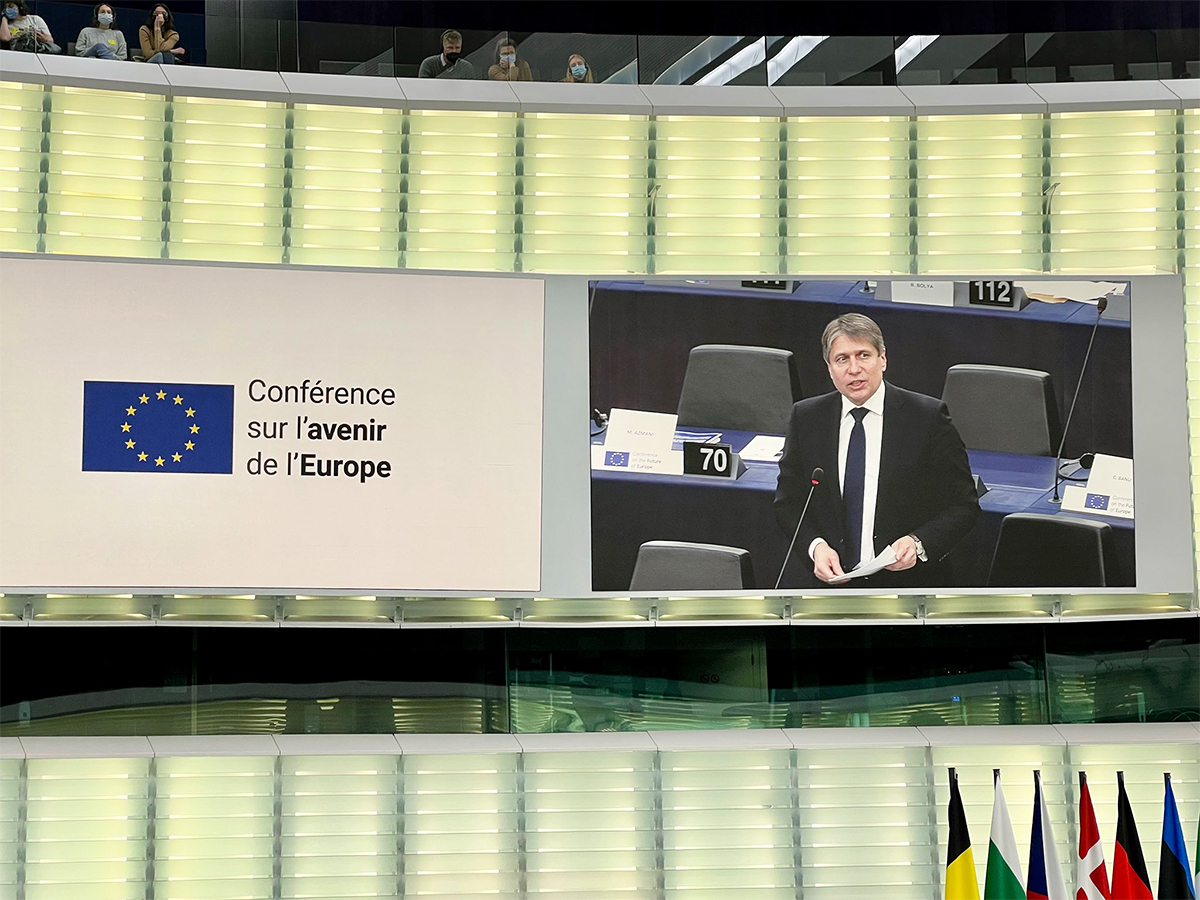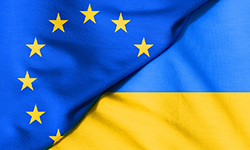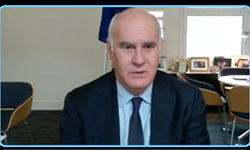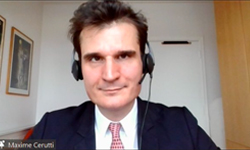BusinessEurope Headlines No. 2022-13
Conference on the Future of Europe: a strong economy is indispensable for a functioning democracy

During the 6th plenary session of the Conference on the Future of Europe on 8 April, BusinessEurope Director General Markus J. Beyrer worked on an important compromise on how to appropriately reflect the necessity of a competitive economy in future EU policy making and debated the future of European democracy with Members of the European Parliament, Members of Parliaments, organised civil society and citizens. He underlined that a vibrant economy is the foundation for a modern and healthy democracy.
Contact: Feustel Christian
Supporting the Ukrainian economy: challenges remain in transport and logistics
 On Friday, 8 April, BusinessEurope representatives met with Taras Kachka, Deputy Minister of Economy and Trade Representative of Ukraine. We had the opportunity to get a better understanding of the situation on the ground and discussed how to support the economy at the time of the war, to facilitate humanitarian aid and mitigate the impact on supply chains. On the positive side, businesses continue to operate in the safe part of Ukraine as much as possible, also maintaining connections with EU business. This is particularly the case for crop production, seeds and the machinery sector ahead of the planting season. Moreover, a lot of companies who have moved offices outside Ukraine for security reasons continue to cover Ukraine operations from abroad, providing vital goods and services. The Ukrainian authorities extend a call on European companies to start resuming operations in Ukraine, to the extent possible. At the same time, challenges in transport and logistics sectors remain significant and concern different modes – road, rail and maritime – as well as certification and insurance-related questions. Ukraine tries to make the most efficient use of existing infrastructure. However, bottlenecks are creating problems, not only for commodities, but also for steel and goods such as car parts, which risk not being delivered on time. BusinessEurope remains committed to discussing these issues further with the Ukrainian and the EU authorities and helping develop solutions.
On Friday, 8 April, BusinessEurope representatives met with Taras Kachka, Deputy Minister of Economy and Trade Representative of Ukraine. We had the opportunity to get a better understanding of the situation on the ground and discussed how to support the economy at the time of the war, to facilitate humanitarian aid and mitigate the impact on supply chains. On the positive side, businesses continue to operate in the safe part of Ukraine as much as possible, also maintaining connections with EU business. This is particularly the case for crop production, seeds and the machinery sector ahead of the planting season. Moreover, a lot of companies who have moved offices outside Ukraine for security reasons continue to cover Ukraine operations from abroad, providing vital goods and services. The Ukrainian authorities extend a call on European companies to start resuming operations in Ukraine, to the extent possible. At the same time, challenges in transport and logistics sectors remain significant and concern different modes – road, rail and maritime – as well as certification and insurance-related questions. Ukraine tries to make the most efficient use of existing infrastructure. However, bottlenecks are creating problems, not only for commodities, but also for steel and goods such as car parts, which risk not being delivered on time. BusinessEurope remains committed to discussing these issues further with the Ukrainian and the EU authorities and helping develop solutions.
Contact: Sofia Bournou
Chinese foreign direct investment in Europe: new report provides insights
 On 8 April 2022, BusinessEurope hosted a webinar on Chinese foreign direct investment (FDI) in the EU-27 and the UK in 2021. At the event, Rhodium Group and the Mercator Institute for China Studies (MERICS) gave BusinessEurope members a preview of the main results of the latest edition of their annual report on “Chinese FDI in the European Union: the implications for European business and policymaking”. The final report will be published at the end of April. “This report sheds light on the recent development of Chinese FDI flows into the EU and factors that had an impact on them. In the current context of political tensions between the EU and China as well as economic disruptions caused by the COVID-19 pandemic and the Russian invasion of Ukraine, this data provides key insights to business and policymakers,” said Luisa Santos, Deputy Director General of BusinessEurope, to conclude the meeting.
On 8 April 2022, BusinessEurope hosted a webinar on Chinese foreign direct investment (FDI) in the EU-27 and the UK in 2021. At the event, Rhodium Group and the Mercator Institute for China Studies (MERICS) gave BusinessEurope members a preview of the main results of the latest edition of their annual report on “Chinese FDI in the European Union: the implications for European business and policymaking”. The final report will be published at the end of April. “This report sheds light on the recent development of Chinese FDI flows into the EU and factors that had an impact on them. In the current context of political tensions between the EU and China as well as economic disruptions caused by the COVID-19 pandemic and the Russian invasion of Ukraine, this data provides key insights to business and policymakers,” said Luisa Santos, Deputy Director General of BusinessEurope, to conclude the meeting.
Contacts: Benedikt Wiedenhofer and Elena Suárez
Exchange of views with EU Ambassador to the UK Vale de Almeida
 “After more than one year of implementation, the EU-UK trade and cooperation agreement has proven to be a cornerstone of our relations. However, our cooperation has not yet reached its full potential. Business is particularly concerned about the tensions around the implementation of the Northern Ireland Protocol and the implications these could have for EU-UK relations”, said Luisa Santos, Deputy Director General of BusinessEurope, to open the latest meeting of the BusinessEurope EU-UK Task Force on 8 April. During the meeting, BusinessEurope members exchanged views on EU-UK relations with the EU Ambassador to the UK, João Vale de Almeida. “We hope the ongoing discussions between the EU and the UK will be productive and lead to a positive, durable outcome. Finding a solution for the situation in Northern Ireland will also allow both sides to deepen their cooperation on issues that will be key for the future competitiveness of EU and UK businesses”, Santos concluded.
“After more than one year of implementation, the EU-UK trade and cooperation agreement has proven to be a cornerstone of our relations. However, our cooperation has not yet reached its full potential. Business is particularly concerned about the tensions around the implementation of the Northern Ireland Protocol and the implications these could have for EU-UK relations”, said Luisa Santos, Deputy Director General of BusinessEurope, to open the latest meeting of the BusinessEurope EU-UK Task Force on 8 April. During the meeting, BusinessEurope members exchanged views on EU-UK relations with the EU Ambassador to the UK, João Vale de Almeida. “We hope the ongoing discussions between the EU and the UK will be productive and lead to a positive, durable outcome. Finding a solution for the situation in Northern Ireland will also allow both sides to deepen their cooperation on issues that will be key for the future competitiveness of EU and UK businesses”, Santos concluded.
Contact: Benedikt Wiedenhofer
Tackling labour and skills shortages across Europe
 In the recent recovery from the COVID-19 crisis, labour and skills shortages have acted increasingly as a growth bottleneck. Achieving higher levels of employment participation in our societies and improving economic migration are two main solutions to address this challenge. To support this, better anticipation of the changing skills content of jobs should be conducted continuously, in particular in the regional and local contexts. Moreover, BusinessEurope’s proposed new Advisory Committee on Employment would be a very useful platform for regular tripartite exchanges between the European Commission, Member States and social partners on labour shortages and strategies to tackle them. As regards to our domestic workforce in the EU, in-work benefits should be looked at across Europe to seize their demonstrated potential to increase employment. Other important measures include providing shorter, module-based training, such as microcredentials, and speeding up at national level the updating of education and training curricula to changing occupations. In particular, ensuring that inactive people have the skills required by the labour markets is a state’s responsibility, for which public employment services have a key role to play. Regarding economic migration from third countries, the Skills and Talents Package, to be published by the Commission at the end of April, will be an important initiative. The goal should be to better target in future economic migrations to Europe in line with our labour market needs. BusinessEurope sees potential in a well-designed EU Talent Pool. The ongoing Ukrainian refugee crisis needs to be managed without losing sight of our medium to long-term objectives for the EU’s economic migration policy. These were the main messages delivered by BusinessEurope Director for Social Affairs Maxime Cerutti during the European network of Public Employment Services Conference titled “Jointly addressing labour and skills shortages”, on 7 April.
In the recent recovery from the COVID-19 crisis, labour and skills shortages have acted increasingly as a growth bottleneck. Achieving higher levels of employment participation in our societies and improving economic migration are two main solutions to address this challenge. To support this, better anticipation of the changing skills content of jobs should be conducted continuously, in particular in the regional and local contexts. Moreover, BusinessEurope’s proposed new Advisory Committee on Employment would be a very useful platform for regular tripartite exchanges between the European Commission, Member States and social partners on labour shortages and strategies to tackle them. As regards to our domestic workforce in the EU, in-work benefits should be looked at across Europe to seize their demonstrated potential to increase employment. Other important measures include providing shorter, module-based training, such as microcredentials, and speeding up at national level the updating of education and training curricula to changing occupations. In particular, ensuring that inactive people have the skills required by the labour markets is a state’s responsibility, for which public employment services have a key role to play. Regarding economic migration from third countries, the Skills and Talents Package, to be published by the Commission at the end of April, will be an important initiative. The goal should be to better target in future economic migrations to Europe in line with our labour market needs. BusinessEurope sees potential in a well-designed EU Talent Pool. The ongoing Ukrainian refugee crisis needs to be managed without losing sight of our medium to long-term objectives for the EU’s economic migration policy. These were the main messages delivered by BusinessEurope Director for Social Affairs Maxime Cerutti during the European network of Public Employment Services Conference titled “Jointly addressing labour and skills shortages”, on 7 April.
Contact: Anna Kwiatkiewicz-Mory
Ensuring consistency at global level on sustainability reporting
 Regular exchanges and cooperation are needed between sustainability reporting actors at international, European and national levels to provide to companies the much-needed clarity and coherence as regards their reporting obligations. The workshops and conference organised by Deutsche Post DHL Group (DPDHL), the Confederation of German Employers (BDA), and the International Organisation of Employers (IOE) provide good space for this and therefore are very welcome. By contrast, the multitude of existing and forthcoming reporting obligations scattered across different frameworks creates complexity and confusion for companies. For example, as part of EU debates on the proposed Corporate Sustainability Reporting Directive (CSRD), we find it absolutely essential to retain the exemption for subsidiaries where there is reporting at group level, both for undertakings and parent undertakings. This should apply to companies headquartered inside and outside the EU. Moreover, as regards the work done at EU level on sustainability reporting standards, consistency between European Financial Reporting Advisory Group (EFRAG) standards and those to come at global level from the newly created International Sustainability Standards Board (ISSB) will be essential to ensure well-designed standards and a global level playing field for companies. These were the key messages by Maxime Cerutti, Social Affairs Director, in a workshop on sustainability reporting organised on 8 April as part of the IOE-BDA-DPDHL international conference and workshop sessions on business and human rights.
Regular exchanges and cooperation are needed between sustainability reporting actors at international, European and national levels to provide to companies the much-needed clarity and coherence as regards their reporting obligations. The workshops and conference organised by Deutsche Post DHL Group (DPDHL), the Confederation of German Employers (BDA), and the International Organisation of Employers (IOE) provide good space for this and therefore are very welcome. By contrast, the multitude of existing and forthcoming reporting obligations scattered across different frameworks creates complexity and confusion for companies. For example, as part of EU debates on the proposed Corporate Sustainability Reporting Directive (CSRD), we find it absolutely essential to retain the exemption for subsidiaries where there is reporting at group level, both for undertakings and parent undertakings. This should apply to companies headquartered inside and outside the EU. Moreover, as regards the work done at EU level on sustainability reporting standards, consistency between European Financial Reporting Advisory Group (EFRAG) standards and those to come at global level from the newly created International Sustainability Standards Board (ISSB) will be essential to ensure well-designed standards and a global level playing field for companies. These were the key messages by Maxime Cerutti, Social Affairs Director, in a workshop on sustainability reporting organised on 8 April as part of the IOE-BDA-DPDHL international conference and workshop sessions on business and human rights.
Contact: Rebekah Smith
Joint industry statements on the Standardisation Strategy
 The European Commission presented its New Standardisation Strategy on 2 February. It was accompanied by a proposal for an amendment to the Regulation on standardisation 1025/2012, a report on its implementation, and the 2022 annual Union work programme for European standardisation. The strategy proposes a set of actions to leverage the European Standardisation system to deliver on the twin and digital transitions, to uphold the integrity, inclusiveness, and accessibility of the system, and ensure future standardisation expertise through education and skills. Businesses welcome the European Commission’s initiative for a European standardisation strategy which rightly stresses the importance of standardisation for our global competitiveness. Along with 16 other organisations, we put forward a set of recommendations towards preserving the inclusive and successful market-driven nature of the standardisation processes. In parallel, BusinessEurope also contributed to the feedback consultation on the targeted legal Amendment to the Regulation on standardisation 1025/2012, which closed on 7 April.
The European Commission presented its New Standardisation Strategy on 2 February. It was accompanied by a proposal for an amendment to the Regulation on standardisation 1025/2012, a report on its implementation, and the 2022 annual Union work programme for European standardisation. The strategy proposes a set of actions to leverage the European Standardisation system to deliver on the twin and digital transitions, to uphold the integrity, inclusiveness, and accessibility of the system, and ensure future standardisation expertise through education and skills. Businesses welcome the European Commission’s initiative for a European standardisation strategy which rightly stresses the importance of standardisation for our global competitiveness. Along with 16 other organisations, we put forward a set of recommendations towards preserving the inclusive and successful market-driven nature of the standardisation processes. In parallel, BusinessEurope also contributed to the feedback consultation on the targeted legal Amendment to the Regulation on standardisation 1025/2012, which closed on 7 April.
![]() Contact: Adnane Lachheb
Contact: Adnane Lachheb
Calendar 
- 10 May: European Economic Governance: A new rulebook?
- 11-12 May: 36th Madrid Forum
- 3 June: BusinessEurope Council of Presidents
- 8-9 June: Reuters Event: Responsible Business Europe 2022
Not yet a subscriber? Register here.
Reminder: please have a look at our privacy policy